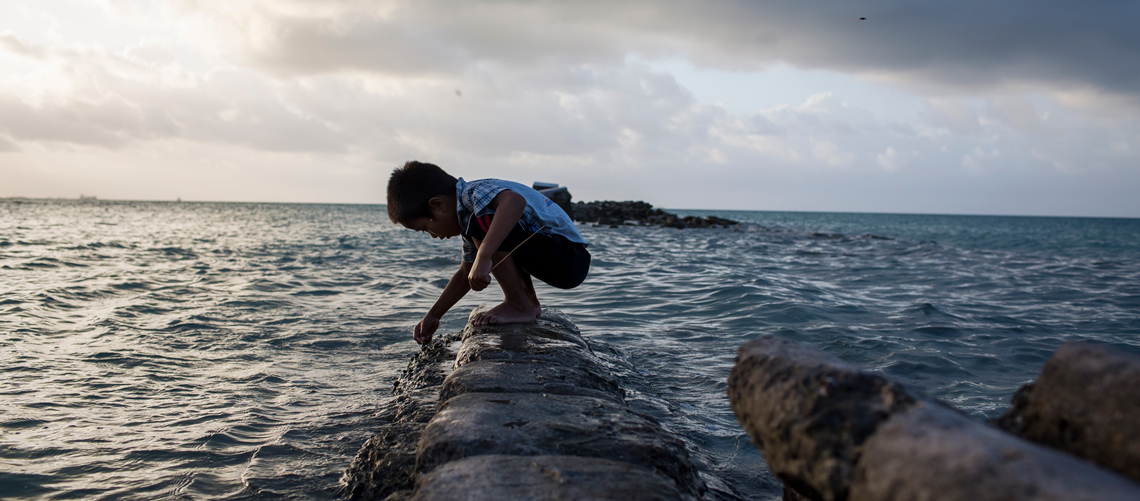 A boy plays on a flooded sea wall in Bikenibeu village, South Tarawa island of Kiribati.
A boy plays on a flooded sea wall in Bikenibeu village, South Tarawa island of Kiribati.
The Republic of the Marshall Islands is one of the world’s atoll nations particularly vulnerable to sea level rise, alongside Kiribati, Tuvalu, and The Maldives. While atoll islands are on the frontline, sea level rise impacts, such as increases in storm severity, decline in coastal ecosystem services and fishery resources, groundwater salinization, and heat waves, are a major threat to the survival of all low-lying coastal areas and cities, including Small Island Developing States (SIDS).
Risks related to sea level rise are a growing concern for the international community. As the Alliance of Small Island States (AOSIS) recently highlighted at the United Nations Security Council, the unprecedented risks associated with sea level rise are a global challenge that requires “meaningful inter-state cooperation” to prevent and minimize impact. A recent report from the Intergovernmental Panel on Climate Change (IPCC) cautioned that the “global mean sea level rise will continue in the 21st century,” posing existential threats to millions of people and disproportionately affecting vulnerable populations that rely on marine ecosystems for their livelihoods and cultural identity.
Globally, more than 70 States are or are likely to be directly affected by sea-level rise, according to the International Law Commission. This is more than one-third of the international community. The indirect repercussions of sea level rise have an increasing impact on all States, which makes sea level rise a global phenomenon relevant to the World Bank’s work across regions. Without immediate and concerted action to reduce global emissions and mitigate climate change, the crisis will only worsen. Higher emissions will lead to faster rates of sea level rise and weakened capacity to “secure a liveable sustainable future for all”.
Rising sea levels are directly impacting the forced movement of people. The World Bank’s 2021 Groundswell report projects that, by 2050 — without concrete climate action and more inclusive development — climate change impacts such as sea level rise will push approximately 216 million people in six regions to move within their countries, mainly from rural to urban areas and low-lying to mountainous areas. Without ambitious adaptation responses to urgently foster climate-resilient sustainable development, sea level rise will increasingly exacerbate the vulnerability levels of people, infrastructure, and ecosystems.
In addition to the multiple crises affecting SIDS and atoll nations, in the coming decades, sea level rise will increasingly trigger a host of issues that pose unprecedented challenges to the international legal order. Understanding the latest legal thinking and policy questions on the implications of sea level rise is a critical element of the planning processes for affected governments and populations.
"Understanding the latest legal thinking and policy questions on the implications of sea level rise is a critical element of the planning processes for affected governments and populations."
This World Bank report, International Law Aspects of Sea Level Rise, assesses the legal aspects of the impacts of sea level rise. It builds on a previous publication from June 2021, Legal Dimensions of Sea Level Rise: Pacific Perspectives, which provided an assessment of key legal frameworks and policy questions that are relevant in the context of sea level rise in the Pacific region.
The latest report focuses on global perspectives and is designed for a global audience. It includes:
- An updated assessment of the impacts of sea level rise on the maritime rights of all islands and coastal states. Linking scientific data with the latest legal thinking, the report shows that, as the sea levels rise, the international community is likely to witness more complex issues and disputes relating to maritime boundaries, due to shifting baselines, retreating coastlines, and the inundation of the offshore features used to measure maritime and marine entitlements.
- Analysis of the human mobility challenges posed by sea level rise including the habitability of SIDS and coastal states, threats to livelihoods and resources, and the potential exacerbation of poverty, violence, and conflict, which can force affected people to move.
- Deep dive into the fragmented international law framework for protecting persons displaced by sea level rise, including the legal tools and policy options to aid adaptation and facilitate safe, orderly, and regular migration.
As coastal populations and assets continue to grow, exposure to impacts associated with sea-level rise is also increasing, according to the World Bank’s report Groundswell Part 2: Acting on Internal Climate Migration. International Law Aspects of Sea Level Rise, offers insights into the lived reality of persons in vulnerable regions and countries while complementing existing regional and national strategies for climate change adaptation and disaster risk management. There are several mechanisms for governments and affected communities to access financial support and technical assistance in designing and implementing measures, including legal and policy strategies, to address the impacts of sea level rise. Affected communities’ efforts to battle rising sea levels would need to be complemented with increasing support from the international community. That’s why we as a Bank and other international Partners need to scale up and catalyze investments to tackle climate change and the impacts of sea level rise and help Atoll nations and SIDS build resilience and adapt to the worst impacts they face – including support where possible with legal implications associated with rising sea levels.
Our new report shows that these are inter-related, complex challenges requiring commensurate levels of support and expertise to tackle them. The global community has a responsibility to step up now and utilize all the tools and knowledge available to ensure that these nations survive and do not become paradise lost forever.



Join the Conversation